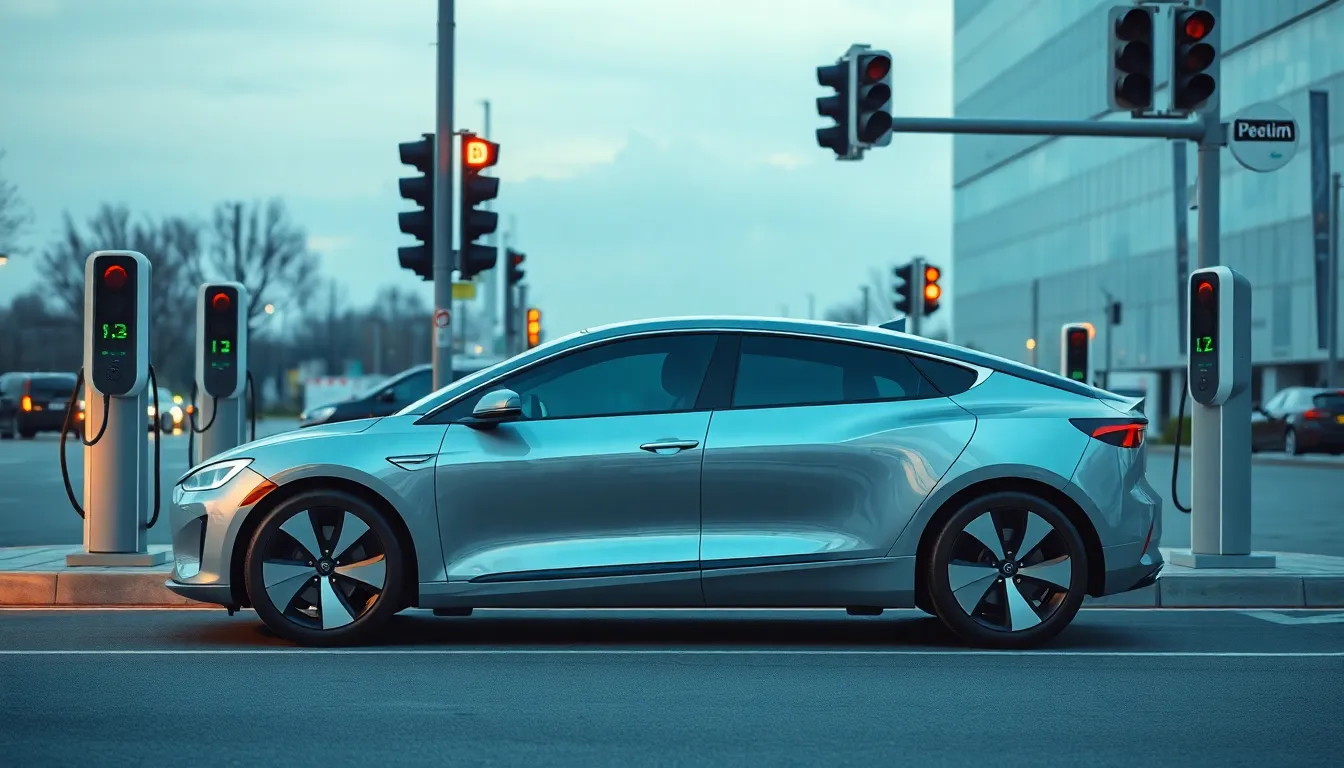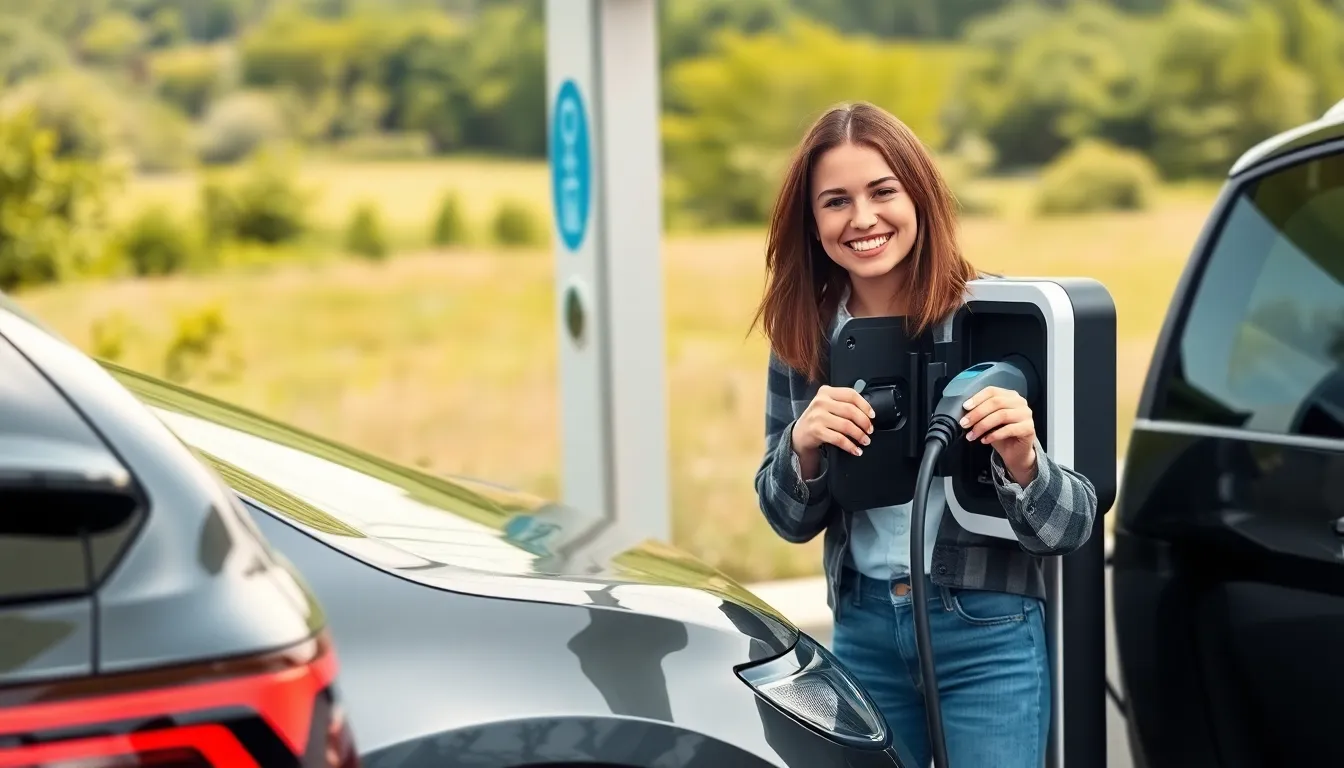The electric car revolution is accelerating, transforming the automotive landscape in ways once thought impossible. With advancements in battery technology, charging infrastructure, and smart features, electric vehicles are becoming more accessible and appealing to drivers everywhere. It’s not just about reducing emissions; it’s about enhancing the driving experience and embracing a sustainable future.
Innovations in electric cars are reshaping how people think about transportation. From longer ranges and faster charging times to cutting-edge autonomous driving capabilities, these vehicles are at the forefront of automotive technology. As manufacturers compete to push the boundaries, consumers can expect a wave of exciting developments that promise to make electric driving more convenient and enjoyable than ever before.
Table of Contents
ToggleOverview of Electric Car Innovations
Electric car innovations focus on three main areas: battery technology, charging infrastructure, and smart features. Advancements in battery technology, such as lithium-silicon and solid-state batteries, enhance energy density and longevity. These innovations increase the driving range of electric vehicles (EVs) to over 300 miles on a single charge, addressing consumer concerns about range anxiety.
Charging infrastructure improvements include fast chargers that can replenish batteries in as little as 30 minutes. The expansion of charging networks makes EVs more convenient for daily use. Public and private partnerships are crucial in rolling out more charging stations, fostering widespread acceptance of electric vehicles.
Smart features play a significant role in electric car innovations. Connected car technology enables real-time data sharing, which improves navigation and maintenance tracking. Additionally, autonomous driving capabilities enhance safety and reduce the driver’s workload, paving the way for a more integrated transportation experience.
These developments reflect a broader commitment to sustainability, reducing carbon emissions while improving the overall driving experience. As electric car technology continues to evolve, consumers benefit from enhanced performance, efficiency, and convenience.
Cutting-Edge Technologies

Electric car innovations incorporate advanced technologies that enhance performance and efficiency. Key areas of focus include battery advancements and autonomous driving features.
Battery Advancements
Battery technology plays a crucial role in electric vehicle performance. Innovations such as lithium-silicon and solid-state batteries enhance energy density, extending driving ranges up to 500 miles on a single charge. These advancements significantly reduce range anxiety for consumers. Fast charging capabilities, utilizing ultra-rapid chargers, can replenish batteries to 80% capacity within 30 minutes, promoting convenience and reducing downtime. Furthermore, companies are investing in recycling methods to reclaim valuable materials from used batteries, contributing to sustainable practices within the industry.
Autonomous Driving Features
Autonomous driving features are transforming the driving experience in electric vehicles. Level 2 and Level 3 autonomy systems, equipped with advanced sensors and AI algorithms, enable vehicles to operate without driver intervention in specific conditions. These systems enhance safety by monitoring surroundings and responding to potential hazards. Features like adaptive cruise control, lane-keeping assistance, and automatic emergency braking are becoming standard. Enhanced connectivity allows vehicles to communicate with each other and infrastructure, optimizing traffic flow and reducing congestion, further improving the overall driving experience.
Eco-Friendly Initiatives
Electric car innovations focus on eco-friendly initiatives that promote sustainability throughout the vehicle lifecycle. These initiatives include sustainable manufacturing processes and recycling efforts designed to minimize waste and reduce environmental impact.
Sustainable Manufacturing Processes
Sustainable manufacturing processes are paramount in the production of electric vehicles. These processes reduce energy consumption and the carbon footprint associated with manufacturing. For instance, automakers are increasingly utilizing renewable energy sources, like solar and wind power, in their production facilities. Materials selection also plays a crucial role; manufacturers prefer materials with lower environmental impacts, such as recycled metals and bio-based plastics, which decrease reliance on fossil fuels. Moreover, closed-loop systems are being adopted, allowing for the reuse of materials at various stages of production, thereby minimizing waste and leading to a more efficient manufacturing cycle.
Recycling and Reuse of Materials
Recycling and reuse of materials significantly contribute to the eco-friendliness of electric vehicles. Many manufacturers engage in battery recycling programs that recover valuable materials, such as lithium, cobalt, and nickel, used in EV batteries. For example, companies like Tesla and BMW have implemented processes to recycle old batteries, which reduces the need for mining new materials. Additionally, repurposing materials from retired vehicles helps in creating new products, further reducing environmental strain. Automotive brands also collaborate with recycling organizations to ensure that battery disposal adheres to strict environmental standards, promoting responsible management of resources throughout the vehicle’s lifecycle.
Major Players in the Industry
The electric vehicle (EV) industry features a mix of established automakers and innovative startups, each contributing to the future of sustainable transportation. Their unique approaches drive advancements in technology and enhance consumer options.
Established Automakers
Established automakers dominate the EV landscape with significant investments in electric technology. Companies like Tesla, Ford, General Motors, and Volkswagen have made substantial advancements in electric vehicles. Tesla’s Model S and Model 3 set benchmarks for performance and range, achieving over 400 miles on a single charge. Ford’s Mustang Mach-E and F-150 Lightning showcase commitment to electrification, offering versatility and capability for various consumers. General Motors plans to launch 30 new electric models by 2025, emphasizing its goal of an all-electric future. Volkswagen’s ID.4 and upcoming ID. Buzz highlight innovative designs and extensive charging network access. These established players leverage their production capabilities and brand loyalty to push electric car adoption further.
Startups and New Entrants
Startups and new entrants are reshaping the electric vehicle market by introducing fresh ideas and technologies. Companies like Rivian, Lucid Motors, and Nio focus on specific consumer needs, enhancing the EV appeal. Rivian’s R1T electric truck combines utility with luxury, aiming for outdoor enthusiasts, while Lucid Motors’ Lucid Air provides an ultra-luxurious experience with over 500 miles of range. Nio emphasizes battery swap technology for faster recharging, reducing downtime for users. Additionally, companies like Fisker and Faraday Future target eco-conscious consumers, incorporating sustainability into their business models. These startups not only challenge traditional automakers but also accelerate innovation and competition in the EV space, providing diverse choices for consumers and fostering a more sustainable automotive industry.
Future Trends in Electric Cars
Electric cars are on the brink of remarkable advancements that promise to reshape the automotive landscape. With ongoing innovations, the electric vehicle (EV) market is poised for significant growth and transformation.
Anticipated Developments
Anticipated developments in electric cars include breakthroughs in battery technology, charging capabilities, and vehicle features.
- Battery Technology: Manufacturers are exploring lithium-sulfur and solid-state batteries, enhancing energy density and reducing charging times. These innovations aim to increase EV driving ranges beyond 600 miles.
- Charging Infrastructure: Integration of ultra-fast charging stations capable of delivering 400 kW power is on the rise, enabling full battery charges in under 15 minutes. Expansion of wireless charging technology is also gaining traction, allowing for seamless power replenishment.
- Vehicle Features: Implementation of advanced driver-assistance systems (ADAS) will continue, offering higher levels of automation. Future electric cars may incorporate vehicle-to-grid technology, allowing them to discharge energy back to the grid, supporting overall grid stability.
Impact on Consumers and the Environment
Innovation in electric vehicles will significantly impact both consumers and the environment.
- Consumer Benefits: Enhanced performance and extended driving ranges promote greater consumer confidence. Reduced fuel and maintenance costs make EVs an economical choice over time. Access to more charging stations will add to the convenience of owning an electric car.
- Environmental Impact: As the production of EVs shifts towards sustainable practices, reductions in carbon footprints will occur. Increased reliance on renewable energy sources for charging will minimize greenhouse gas emissions, promoting cleaner air quality. Initiatives for recycling and repurposing batteries will further support environmental sustainability, aligning with global efforts to combat climate change.
The electric vehicle landscape is evolving rapidly with innovations that promise a cleaner and more efficient future. As battery technology advances and charging infrastructure expands, consumers are becoming increasingly confident in making the switch to electric. The integration of smart features not only enhances safety but also transforms the driving experience, making it more enjoyable.
Sustainability remains at the forefront of these developments. Automakers are prioritizing eco-friendly practices throughout the vehicle lifecycle, ensuring that electric cars contribute positively to the environment. With major players and startups alike pushing boundaries, the future of electric vehicles looks promising, paving the way for a greener tomorrow.



